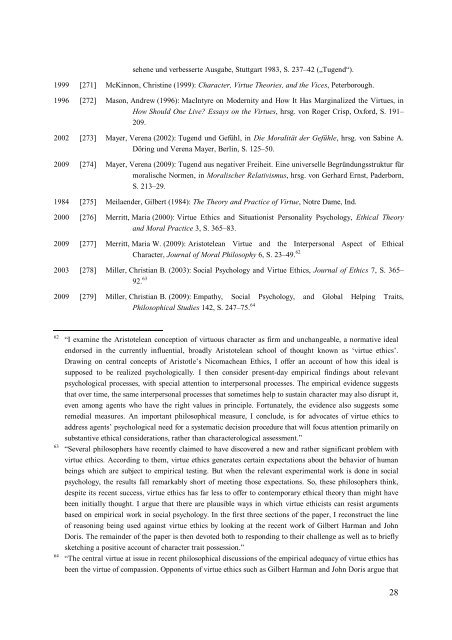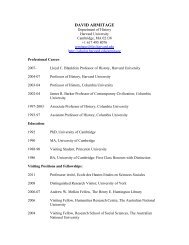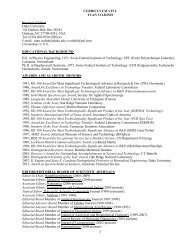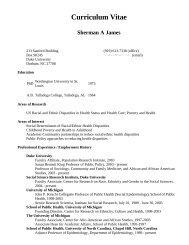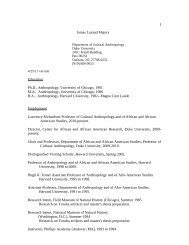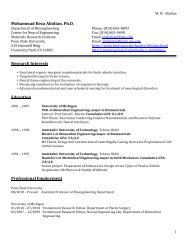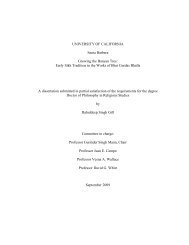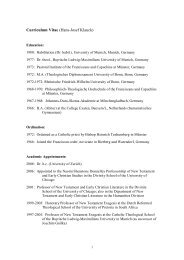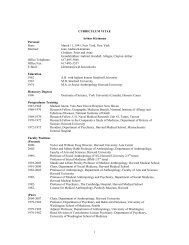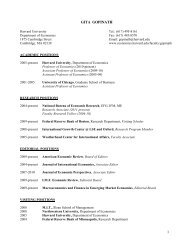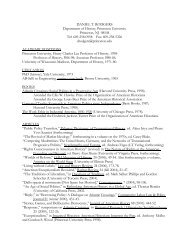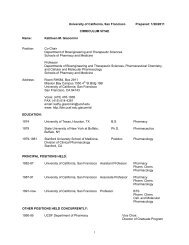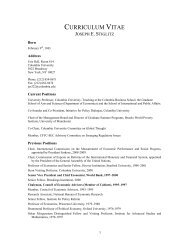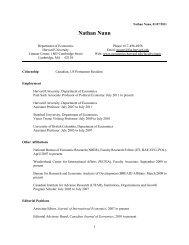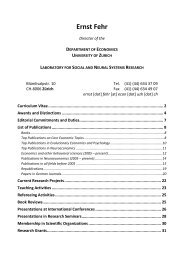sehene und verbesserte Ausgabe, Stuttgart 1983, S. 237–42 („Tugend“).1999 [271] McKinn<strong>on</strong>, Christine (1999): Character, <strong>Virtue</strong> Theories, and the Vices, Peterborough.1996 [272] Mas<strong>on</strong>, Andrew (1996): MacIntyre <strong>on</strong> Modernity and How It Has Marginalized the <strong>Virtue</strong>s, inHow Should One Live? Essays <strong>on</strong> the <strong>Virtue</strong>s, hrsg. v<strong>on</strong> Roger Crisp, Oxford, S. 191–209.2002 [273] Mayer, Verena (2002): Tugend und Gefühl, in Die Moralität der Gefühle, hrsg. v<strong>on</strong> Sabine A.Döring und Verena Mayer, Berlin, S. 125–50.2009 [274] Mayer, Verena (2009): Tugend aus negativer Freiheit. Eine universelle Begründungsstruktur fürmoralische Normen, in Moralischer Relativismus, hrsg. v<strong>on</strong> Gerhard Ernst, Paderborn,S. 213–29.1984 [275] Meilaender, Gilbert (1984): The Theory and Practice of <strong>Virtue</strong>, Notre Dame, Ind.2000 [276] Merritt, Maria (2000): <strong>Virtue</strong> Ethics and Situati<strong>on</strong>ist Pers<strong>on</strong>ality Psychology, Ethical Theoryand Moral Practice 3, S. 365–83.2009 [277] Merritt, Maria W. (2009): Aristotelean <strong>Virtue</strong> and the Interpers<strong>on</strong>al Aspect of EthicalCharacter, Journal of Moral Philosophy 6, S. 23–49. 622003 [278] Miller, Christian B. (2003): Social Psychology and <strong>Virtue</strong> Ethics, Journal of Ethics 7, S. 365–92. 632009 [279] Miller, Christian B. (2009): Empathy, Social Psychology, and Global Helping Traits,Philosophical Studies 142, S. 247–75. 64626364“I examine the Aristotelean c<strong>on</strong>cepti<strong>on</strong> of virtuous character as firm and unchangeable, a normative idealendorsed in the currently influential, broadly Aristotelean school of thought known as ‘virtue ethics’.Drawing <strong>on</strong> central c<strong>on</strong>cepts of Aristotle’s Nicomachean Ethics, I offer an account of how this ideal issupposed to be realized psychologically. I then c<strong>on</strong>sider present-day empirical findings about relevantpsychological processes, with special attenti<strong>on</strong> to interpers<strong>on</strong>al processes. The empirical evidence suggeststhat over time, the same interpers<strong>on</strong>al processes that sometimes help to sustain character may also disrupt it,even am<strong>on</strong>g agents who have the right values in principle. Fortunately, the evidence also suggests someremedial measures. An important philosophical measure, I c<strong>on</strong>clude, is for advocates of virtue ethics toaddress agents’ psychological need for a systematic decisi<strong>on</strong> procedure that will focus attenti<strong>on</strong> primarily <strong>on</strong>substantive ethical c<strong>on</strong>siderati<strong>on</strong>s, rather than characterological assessment.”“Several philosophers have recently claimed to have discovered a new and rather significant problem withvirtue ethics. According to them, virtue ethics generates certain expectati<strong>on</strong>s about the behavior of humanbeings which are subject to empirical testing. But when the relevant experimental work is d<strong>on</strong>e in socialpsychology, the results fall remarkably short of meeting those expectati<strong>on</strong>s. So, these philosophers think,despite its recent success, virtue ethics has far less to offer to c<strong>on</strong>temporary ethical theory than might havebeen initially thought. I argue that there are plausible ways in which virtue ethicists can resist argumentsbased <strong>on</strong> empirical work in social psychology. In the first three secti<strong>on</strong>s of the paper, I rec<strong>on</strong>struct the lineof reas<strong>on</strong>ing being used against virtue ethics by looking at the recent work of Gilbert Harman and JohnDoris. The remainder of the paper is then devoted both to resp<strong>on</strong>ding to their challenge as well as to brieflysketching a positive account of character trait possessi<strong>on</strong>.”“The central virtue at issue in recent philosophical discussi<strong>on</strong>s of the empirical adequacy of virtue ethics hasbeen the virtue of compassi<strong>on</strong>. Opp<strong>on</strong>ents of virtue ethics such as Gilbert Harman and John Doris argue that28
2009 [280] Miller, Christian (2009): Social Psychology, Mood, and Helping: Mixed Results for <strong>Virtue</strong>Ethics, Journal of Ethics 13, S. 145–73. 652005 [281] Millgram, Elijah (2005): Reas<strong>on</strong>ably Virtuous, in Millgram, Ethics D<strong>on</strong>e Right. PracticalReas<strong>on</strong>ing as a Foundati<strong>on</strong> for Moral Theory, Cambridge, S. 133–67.1998 [282] Milo, R<strong>on</strong>ald D. (1998): <strong>Virtue</strong>, Knowledge, and Wickedness, in <strong>Virtue</strong> and Vice, hrsg. v<strong>on</strong>Ellen Frankel Paul, Fred D. Miller, Jr. und Jeffrey Paul, Cambridge, S. 196–232.1992 [283] M<strong>on</strong>tague, Phillip (1992): <strong>Virtue</strong> Ethics: A Qualified Success Story, American PhilosophicalQuarterly 29. Wiederabgedruckt in <strong>Virtue</strong> Ethics. A Critical Reader, hrsg. v<strong>on</strong> DanielStatman, Edinburgh 1997, S. 194–204.1998 [284] M<strong>on</strong>tmarquet, James A. (1998): An Asymmetry C<strong>on</strong>cerning <strong>Virtue</strong> and Vice, Canadian Journalof Philosophy 28, S. 149–59.2008 [285] M<strong>on</strong>tmarquet, James A. (2008): The Voluntariness of <strong>Virtue</strong> – and Belief, Philosophy 83, S.373–90. 661990 [286] Moravcsik, Julius M. (1990): The Role of <strong>Virtue</strong> in Alternatives to Kantian and UtilitarianEthics, Philosophia 20, S. 33–48.1998 [287] Müller, Anselm Winfried (1998): Was taugt die Tugend? Elemente einer Ethik des gutenLebens. Mit einem Gespräch mit August Everding, Stuttgart: Kohlhammer.1996 [288] Nida-Rümelin, Julian (1996): Theoretische und Angewandte Ethik: Paradigmen,Begründungen, Bereiche, in Angewandte Ethik. Die Bereichsethiken und ihretheoretische Fundierung. Ein Handbuch, hrsg. v<strong>on</strong> Julian Nida-Rümelin, Stuttgart, S.2–85: S. 31–37 („Das tugendethische Paradigma (<str<strong>on</strong>g>Tugendethik</str<strong>on</strong>g>)“).1984 [289] Nielsen, Kai (1984): Critique of Pure <strong>Virtue</strong>. Animadversi<strong>on</strong>s <strong>on</strong> a <strong>Virtue</strong>-Based Ethic, in <strong>Virtue</strong>and Medicine, hrsg. v<strong>on</strong> E. E. Shelp, Dordrecht, S. 133–49. Wiederabgedruckt in6566experimental results from social psychology c<strong>on</strong>cerning helping behavior are best explained not byappealing to so-called ‘global’ character traits like compassi<strong>on</strong>, but rather by appealing to externalsituati<strong>on</strong>al forces or, at best, to highly individualized ‘local’ character traits. In resp<strong>on</strong>se, a number ofphilosophers have argued that virtue ethics can accommodate the empirical results in questi<strong>on</strong>. My ownview is that neither side of this debate is looking in the right directi<strong>on</strong>. For there is an impressive array ofevidence from the social psychology literature which suggests that many people do possess <strong>on</strong>e or morerobust global character traits pertaining to helping others in need. But at the same time, such traits arenoticeably different from a traditi<strong>on</strong>al virtue like compassi<strong>on</strong>.”“I first summarize the central issues in the debate about the empirical adequacy of virtue ethics, and thenexamine the role that social psychologists claim positive and negative mood have in influencingcompassi<strong>on</strong>ate helping behavior. I argue that this psychological research is compatible with the claim thatmany people might instantiate certain character traits after all which allow them to help others in a widevariety of circumstances. Unfortunately for the virtue ethicist, however, it turns out that these helping traitsfall well short of exhibiting certain central features of compassi<strong>on</strong>.”“This paper examines the relative voluntariness of three types of virtue: ‘epistemic’ virtues like openmindedness;‘motivati<strong>on</strong>al’ virtues like courage, and more robustly ‘moral’ virtues like justice. A somewhatnovel c<strong>on</strong>cepti<strong>on</strong> of the voluntariness of belief is offered in terms of the limited, but quite real, voluntarinessof certain epistemic virtues.”29
- Page 1: Literatur
- Page 4 and 5: national Journal of Management Revi
- Page 6: 53.2010 [39] Battaly, Heather (2010
- Page 9 and 10: 2005 [60] Brady, Michael S. (2005):
- Page 11 and 12: 2008 [72] Calhoun, Cheshire (2008):
- Page 13 and 14: 1998 [93] Cooper, John M. (1998): T
- Page 15 and 16: 2005 [120] Doris, John M. (2005): R
- Page 17 and 18: 1978 [138] Foot, Philippa (1978): V
- Page 19 and 20: 1996 [166] Griffin, James (1996): V
- Page 21 and 22: 166-84.1996 [188] Hooker, Brad (199
- Page 23 and 24: Theory and Moral Practice 8, S. 387
- Page 25 and 26: Ethics, hrsg. von Patricia H. Werha
- Page 27: Deutsche Zeitschrift für Philosoph
- Page 31 and 32: 2000 [299] Oderberg, David S. (2000
- Page 33 and 34: Moral Education 24, S. 175-184.1997
- Page 35 and 36: Southern Journal of Philosophy 14,
- Page 37 and 38: 1997 [379] Slote, Michael (1997): V
- Page 39 and 40: 2009 [401] Sreenivasan, Gopal (2009
- Page 41 and 42: 2010 [416] Stohr, Karen E. (2010):
- Page 43 and 44: 2008 [441] Tessman, Lisa (2008): Re
- Page 45 and 46: 2009 [457] van Zyl, Liezl (2009): A
- Page 47 and 48: 2006 [475] Webber, Jonathan (2006):
- Page 49 and 50: 2008 [484] White, Richard (2008): R


